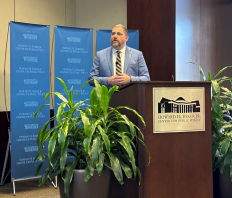
How Tennessee can become a hub for transportation innovation
Tennessee currently supports 40 percent of the EV manufacturing jobs and investments in the southeast, but ranks 41st in the country for industrial R&D.
As transportation evolves, and the focus on car travel shifts from the combustion engine to the electric battery, Tennessee is already a key player in the world of manufacturing. Ford, GM, Nissan, and Volkswagen all have manufacturing locations across the state, with people ready to work at their plants.
What Tennessee is not leading in is automotive research and development (R&D). If the state wants to attract, train, and then keep talent in the automotive world, a shift in priorities when it comes to workforce development and research transfer may be the key.
That’s according to Kevin Heaslip, the new Director of the University of Tennessee, Knoxville’s Center for Transportation Research (UTK CTR). In a lecture at the Howard H. Baker Jr. Center for Public Policy Thursday, Heaslip walked through the current and hopeful future mobility ecosystem in Tennessee.
He said there are currently 930 companies related to the automotive industry in the state. Those that primarily make parts specific to internal combustion engines may have to switch their focus as the push for electric vehicles (EV) becomes more top-of-mind. The state has started to implement EV manufacturing and use, but Heaslip said there is a need for research, too, not just assembly.
Heaslip said reasons for local EV technology research include improving economic development and taking into consideration climate change. It’s also about keeping up with mobility trends and seeing how people’s wants are changing.
When it comes to mobility trends, Heaslip identified five main categories: connected, autonomous, shared, electrified, and cybersecurity. Let’s break those down.
- Connected – how will cars be able to connect to each other or other buildings via satellites, wifi, etc.?
- Autonomous – how will autonomous features like cruise control or blindspot sensors adapt to eventual self-driving cars?
- Shared – everyone’s taken an Uber or Lyft. Will sharing cars become cheaper and easier than everyone owning their own?
- Electrified – moving away from gasoline and toward electric batteries.
- Cybersecurity – can a plugged-in, charging EV serve as a gateway to hack the power grid?
In many cases, the technology needed to move these trends forward is too expensive. Heaslip said he knows from his time working in the automotive industry that “if you’re trying to put something in the vehicle, it better not cost more than $5.” In order to mass produce new features, they have to be affordable.
That’s where R&D comes in. Heaslip outlines three goals for future mobility research: understanding industry needs, embodying a culture of collaboration with partners and stakeholders across the state, and generating and translating use-inspired research.
Tennessee currently supports 40 percent of the EV manufacturing jobs and investments in the southeast, and the state has several workforce development programs in place to support those going into trades. But Tennessee ranks 41st in the country for industrial R&D.

Why? Heaslip said it’s a matter of connectivity. Universities and other research institutions in the state are making huge advancements, but those findings never make it out into the world. Heaslip said there’s a need to get businesses and venture capital firms into these institutions to see how their research can be brought from the lab to the factory.
“We have people that are trained here in Tennessee that don’t have a place to go in Tennessee,” said Heaslip, so the ideas that are born here leave to go to other automotive hubs where they can be implemented. “We want to bring people in-state instead of forcing them to go out,” he said.
That gap between the research and the real world is where building connections can make a difference. Heaslip said this isn’t a problem for one entity to solve. It will take partnerships between every university, research institution, and relevant state departments to bridge the gap.
Heaslip also noted that even with the push for more research, there are challenges when moving forward with EVs, automation, and cybersecurity.
With EVs, manufacturers have to keep safety in mind while manufacturing lighter-weight cars. Heaslip said more battery research needs to be done to lower the cost, and infrastructure will need to be reimagined to support charging for batteries across the state.
With automation, Heaslip said changes in hardware and software will require a more specifically skilled workforce. As self-driving cars become more of a reality, he said there will also be the legal and ethical questions of who to blame if an automated car gets into an accident.
With cybersecurity, a study of automotive cybersecurity professionals found that 84 percent have concerns that cybersecurity practices are not keeping pace with evolving technologies. All the advances need to work together and not be out-paced.
Heaslip said workforce development, research, and translation of that research into practice are the three key factors that can move Tennessee forward as a mobility leader, and it all comes down to the connectivity of state entities all working together to accomplish the same goal.
Like what you've read?
Forward to a friend!

